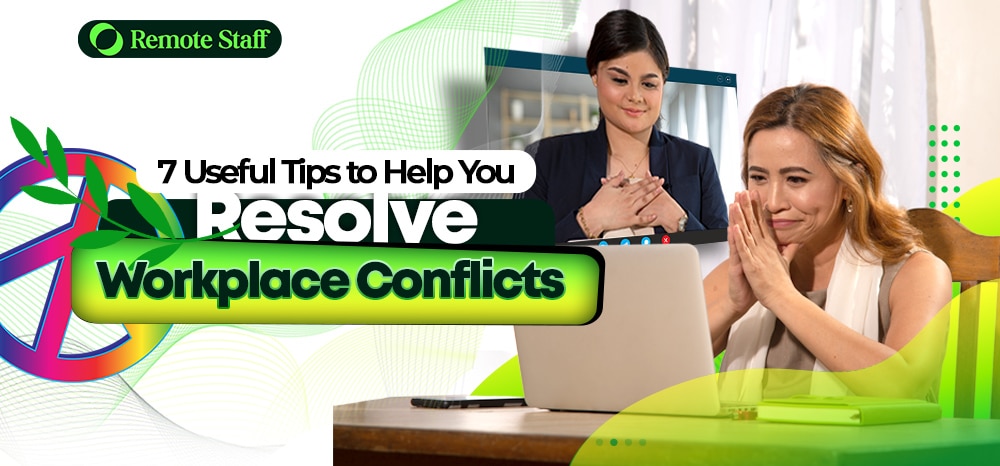Conflicts are an inevitable part of any organization, especially the workplace. No matter how friendly you are with your co-workers, there are bound to be disagreements among you, which will cause friction.
However, not all workplace conflicts are detrimental to your team’s performance. Some, like conflicts of ideas, can help generate new ones and bring about positive change among your remote team.
That said, conflicts stemming from clashes between personalities rarely lead to anything productive. These often lead to workplace drama and could adversely affect everyone’s productivity and motivation to work. At worst, it can lead to employees leaving the company.
To prevent these from happening, you must be capable of handling conflicts in the workplace, particularly to prevent them from escalating.
But how do you do so? To help you avoid the detrimental effects of workplace conflicts, here are seven workplace conflict resolution tips.

Identify and Address the Cause of the Conflict.
The first of the workplace conflict resolution tips is to identify the cause of the conflict. Doing this gives you a better grasp of the situation and helps you plan a better course of action.
Some examples of common causes of workplace conflicts include competition for resources, misunderstandings at work, and differing goals between departments.
Once you’ve identified the source of the issue, the next step is to address it as soon as possible. Delaying this can cause the conflict to escalate until it starts disrupting your work.

Reach Out and Talk to the Other Person.
The next workplace conflict resolution tip is to reach out and talk to the person you’re not seeing eye to eye to. Of course, this is easier said than done, especially if you two are still angry with each other.
However, the conflict will only grow worse if you continue to give each other the cold shoulder.
Thus, the most important thing to do is to find a safe space where you and the other person can talk things out peacefully. If you’re both working online jobs, this could be through a private call or chat.

Give the Other Person a Chance to Talk and Listen to Them Carefully.
Remember that it takes two to communicate. Don’t monpolize the conversation – as this might make them feel that you called them just to scold them.
Instead, listen to their side of the story as well. Doing so helps you understand their side so you can find common ground, which you can use to potentially solve the problem.

Acknowledge Their Constructive Feedback.
Of course, listening to their side of the story could entail hearing out their not-so-positive opinions about you or your work.
When this happens, resist the urge to get defensive, as doing so can potentially shut down any opportunity for you to talk things out peacefully.
Instead, you should acknowledge their constructive feedback and try to find the takeaway there.
It is also vital to empathize with your co-worker so you can move on to the next step. Doing so helps you understand their point of view and how you can find a compromise to solve the problem.

Find Your Common Ground With Them.
Once you two have listened to each other’s sides, it’s time to find common ground.
You can start by summarizing what the two of you have discussed thus far and finding the points you agree with. Ensure you collaborate with them to get their input and find compromises on areas the two of you still disagree on.
Of course, this process may take some time, so don’t worry if you haven’t hashed anything out during your first discussion. Just keep communicating with them regularly until you reach an agreement.

Document Your Agreement.
To ensure that you two won’t forget about your agreement (and so that you have evidence in case someone breaches it), document the terms you’ve agreed upon. This could be a recording of your call or a physical or digital document containing the points you discussed.

Assess the Effectiveness of Your Solutions.
After brainstorming solutions to resolve your issues, it’s time to put these to the test.
If you’re no longer experiencing issues with your co-worker, great! Just keep at it while consciously striving to prevent the same things from happening again.
But what if the solution you both came up with didn’t work? Or what if the other person didn’t abide by the agreement?
In the latter’s, you can talk to your co-worker again and remind them of your agreement. This time, however, you should bring in a mediator to help.
If they still refuse to change, and you’ve tried all the other workplace conflict resolution tips above, it could be time to bring in your company’s HR.

Crisis, Averted!
For many, handling conflicts within the workplace is a challenging, so much so that their primary response is either sweeping it under the rug or simply engaging in workplace gossip.
However, these won’t make the problem go away. In fact, it will only make things worse. Fortunately, following the aforementioned workplace conflict resolution tips will help you resolve arguments with your co-workers better.
If your primary challenge today is finding the right online job, Remote Staff is here to help. Our jobs list has a wide range of openings to choose from.
And if you don’t find the job you want today? You can just return tomorrow and see if there’s a position you like, as we update our list daily.
Good luck!

